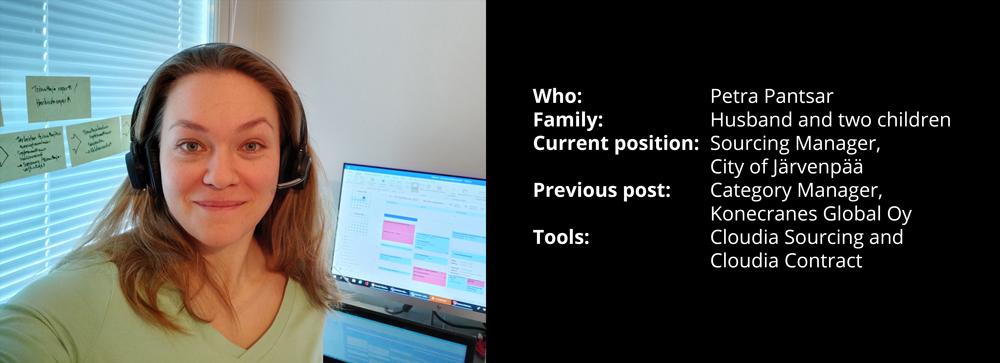- Articles
Exceptional situation providing the opportunity for developing procurement operations
Sourcing Manager Petra Pantsar has worked in both the private and public sectors, and she promotes an example of how a procurement team can operate efficiently and responsibly during exceptional situations as well. Read about Petra’s tips and be inspired!

1. How have the exceptional circumstances affected your daily life and how has the change been?
Our procurement unit members are now working from home, just like the rest of the offices. I am very grateful for the fact that things are good in my life today – my family is together, my children are at home and doing their part to ensure that our new, daily routine works. They don’t miss day care, they are happy to get to spend more time with mum and dad. I believe that the situation is much more challenging for people living alone and for those who, for example, don’t have a pet to help them maintain a daily routine. Of course, my working day gets interrupted by my kids, but we have managed well. There are many positive sides to this exceptional situation as well. For example, we are provided with the opportunity to slow down and pay attention to the people close to us.
2. How is the exceptional situation visible in your work as a Sourcing Manager?
As the supervisor, I am responsible for the well-being of my team. It is an unfortunate fact that this situation may last even for months. We must be able to prepare for this and develop ways of working that help us carry on with the work and maintain our health and well-being. People are reacting very differently to the new situation. That is why it’s important to maintain active communication with other people and to increase human contacts through, for example, a video connection or by asking how the other person is doing. During this exceptional time, good and humane supervisory work matters and will have long-lasting impacts.
Personally, I am very used to working remotely – in my previous post as a Category Manager at Konecranes, I took care of matters over a remote connection all around the world on a daily basis without physically meeting the people I was doing business with. In my post at the City of Järvenpää, I have encouraged and directed my team towards remote work since last autumn, so we had already established functional ways of working and were able to adapt to the change very quickly.
Fortunately, we have Cloudia’s functional solutions helping us in this situation as well. Procurement and the related work, such as mapping, calls for tender, sourcing, dialogue and management of supplier relations, are carried out just like before the crisis. We have not had any technical problems or other service disruptions during the state of emergency.
3. What challenges does the exceptional situation cause for your procurement operations?
The challenge lies in how to respond to the reliability related to suppliers. From the contractual point of view, the coronavirus is regarded as a force majeure that prevents the fulfillment of an agreed obligation. That means that the buyer and the supplier have the right to terminate the contract. The future of many Finnish companies depends on how the Finnish municipalities and cities react to the situation. For example, what’s the best course of action in situations with room for interpretation? Handling the exceptional situation requires constant balancing between realities and responsibilities. Instead of short-term thinking, I believe it’s best to keep in mind that life will continue after the coronavirus. Good supplier relationships are required today and tomorrow, perhaps even more tomorrow than today.
In Järvenpää, we examine matters contract by contract. I have underlined the importance of requesting from the local companies tenders for small-scale acquisitions in order to keep the city’s wheels rolling. We all benefit from this. We operate according to our procurement principles – flexibly and at the right time. At the same time, we try to reach the most economically advantageous solution for the city.
4. You are working with Cloudia’s solutions in tendering operations and contract management. What are the current benefits of these solutions for your team?
The combination of sourcing and contract management makes our procurement team’s work significantly more flexible and efficient, both now and after the exceptional situation. The fact that all information is in order, up to date and quickly available to the people who need it is especially important for the success of remote work. The integrations of Cloudia’s solutions to our case management system also facilitates our work. In my opinion, the case management system in the public sector corresponds with the production control system in the private sector: the production control system is used for ordering parts, signing for production orders, sending products to the client and invoicing. In the case management system, a case is investigated, the preparations and decisions are made and, finally, a notification is made or the case is closed.
I got acquainted with Cloudia’s solutions for the first time when I started in my new post at the City of Järvenpää, and I quickly discovered that their solutions have all the features that the private sector can only dream about. Cloudia’s solutions are truly excellent and versatile tools, provided that their implementation has been thoroughly carried out and that people remember to utilize the great features of the solutions.

5. Do you have any tips for other people in charge of procurement in this situation?
I think it is now time to focus on the development of our own know-how and digital tools. Have you put the procurement system completely into operation? Have all the contracts, documents and information been transferred to the system? Do you know what the system is really capable of? I believe that many organizations still have a long way to go with regard to these measures. I challenge my colleagues to reserve at least two hours every week for making sure that the basic matters are in order, for developing themselves and learning new things. I also encourage the public sector to develop the strategies of their procurement procedures. That’s how we can move on even stronger after the crisis.
6. In your opinion, what are the opportunities that the exceptional situation offers to procurement?
This is our opportunity to strengthen the strategic role of procurement operations. Traditionally, procurement operations in the private sector have focused on economizing, while the public sector has focused on using entire budgets. However, the objective of both sectors should really be the development of operations. Procurement is much more than tendering. For example, why something is procured and for which purpose, how we operate during and after a contract period, what we learn from complaints and what development measures are taken matters to all organizations. If there is no systematic process for supplier management and if we do not have open, active dialogue with our suppliers, how can we develop our supplier relations, quality and client satisfaction?
The strategic thinking of procurement is important for both the public and private sector because the same principles apply in both sectors. The organization must acknowledge their objectives, plan how to reach the objectives in the best possible way and think about ways of making a difference with their procurement operations.
The importance of strategic procurement operations is highlighted not only during exceptional situations but also when the public budgets tighten. Well-planned procurement means a more stable economy that ultimately affects the everyday lives of our taxpayers. Fortunately, appreciation for strategic development is increasing in the public sector as well. This is evident in the increase of the amount of organized training related to the subject in the municipalities and cities. In September 2019, the Ministry of Finance and the Association of Finnish Municipalities established a public procurements program with similar objectives. The promoter of the program Hankinta Suomi will formulate a procurement strategy for the entire country. The strategy will be made public in the fall 2020.
I wish everyone health and happiness during these challenging times. We will move forward from this, stronger and wiser than before!
Read about strategic sourcing and see how Cloudia’s solutions are utilized at the Ministry for Foreign Affairs of Finland and the City of Lohja!


